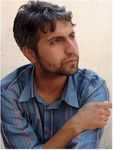RAMALLAH (Ma'an) -- Palestinian prisoners' organizations called for attention to the health condition of detainees in Israeli jails this week.
On Tuesday, Director of the Center for Defense of liberties and civil rights 'Hurriyyat,' Hilmi Al-Araj, said that the Israeli intelligence service,the Shabak, is responsible for the life of Haitham Salhieh, 27, who has been detained since November 6, 2002, and sentenced to two life sentences and three years in a Beersheba prison.
The Israeli prison service gave Salhieh immune-system weakening medications, in an assassination attempt, the center alleged.
Tuesday afternoon, dozens gathered in Al-Manara square in the West Bank city of Ramallah, in support of Salhieh, and calling for international pressure on Israel to release him.
On Wednesday, the Prisoners' society in Ramallah raised the case of detainee Ahed Abu Ghilemh, who has been kept in solitary confinement for over a year without explanation, according to his wife.
The center said Abu Ghilemh has been kept in isolation since 2010, and in March 2011, this was renewed for another year, quoting his wife.
On Thursday, the Palestinian detainees’ center in Tubas appealed for the life of detainee Khaled Al-Shawish, who suffers from paralysis.
Around 700 Palestinian prisoners remained in Israeli jails in 2010, according to the Palestinian Central Bureau of Statistics.
Al-Shawish, who is serving a life sentence at Al-Ramla prison in Israel, is in a critical health condition, according to the center,
We don’t want Israel to release our sons as dead bodies, we want them alive and in a good health condition, the center said.
Around 7,000 Palestinian prisoners remained in Israeli jails in 2010, according to the Palestinian Central Bureau of Statistics.
On Tuesday, Director of the Center for Defense of liberties and civil rights 'Hurriyyat,' Hilmi Al-Araj, said that the Israeli intelligence service,the Shabak, is responsible for the life of Haitham Salhieh, 27, who has been detained since November 6, 2002, and sentenced to two life sentences and three years in a Beersheba prison.
The Israeli prison service gave Salhieh immune-system weakening medications, in an assassination attempt, the center alleged.
Tuesday afternoon, dozens gathered in Al-Manara square in the West Bank city of Ramallah, in support of Salhieh, and calling for international pressure on Israel to release him.
On Wednesday, the Prisoners' society in Ramallah raised the case of detainee Ahed Abu Ghilemh, who has been kept in solitary confinement for over a year without explanation, according to his wife.
The center said Abu Ghilemh has been kept in isolation since 2010, and in March 2011, this was renewed for another year, quoting his wife.
On Thursday, the Palestinian detainees’ center in Tubas appealed for the life of detainee Khaled Al-Shawish, who suffers from paralysis.
Around 700 Palestinian prisoners remained in Israeli jails in 2010, according to the Palestinian Central Bureau of Statistics.
Al-Shawish, who is serving a life sentence at Al-Ramla prison in Israel, is in a critical health condition, according to the center,
We don’t want Israel to release our sons as dead bodies, we want them alive and in a good health condition, the center said.
Around 7,000 Palestinian prisoners remained in Israeli jails in 2010, according to the Palestinian Central Bureau of Statistics.





























 Ajuad ZidanWar Resisters' International learnt today that Israeli conscientious objector
Ajuad ZidanWar Resisters' International learnt today that Israeli conscientious objector